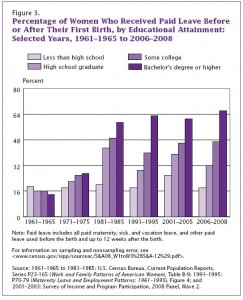 More than half of new mothers now get paid leave from work, the U.S. Census Bureau announced last week. At face value the news might seem like cause for celebration, but some have dug deeper to expose exactly which mothers were getting paid leave.
More than half of new mothers now get paid leave from work, the U.S. Census Bureau announced last week. At face value the news might seem like cause for celebration, but some have dug deeper to expose exactly which mothers were getting paid leave.
The 22-page census report reported that a super-slim majority of women were getting paid leave: 51 percent of first-time mothers were able to take paid maternity, sick, or vacation time between 2006 and 2008. Hence the divide between which half of moms headlines highlighted:
“Majority of new moms are getting paid leave” (Minneapolis Star Tribune)
“Paid-leave benefits lagging for working moms in U.S.” (Chicago Tribune)
“Census shows half of working women don’t get paid maternity benefits; wide gaps by education” (Associated Press)
The lack of access to paid leave among women who haven’t completed college is raising concern. According to the AP article, “Lower-educated mothers are nearly four times more likely than college graduates to be denied paid maternity benefits. That’s the widest gap over the past 50 years.” (The chart above illustrates the comparison.)
New York University sociologist Kathleen Gerson, author of The Unfinished Revolution: Coming of Age in a New Era of Gender, Work, and Family, shared her opinion. “This isn’t good news for women at the bottom, and the irony is that the people with the most children are now the least likely to have the supports they need,” she told the Associated Press.
University of Minnesota sociologist Erin Kelly echoed Gerson’s sentiment when interviewed by the Star Tribune. “People who are already living paycheck to paycheck, if they don’t have access to paid leave they’re going to have to quit or they’re going to have to do something that is really unhealthy for themselves or their babies,” Kelly told the paper. “The lack of [federal] paid leave policy means in effect we are pushing those women to quit.”

Comments